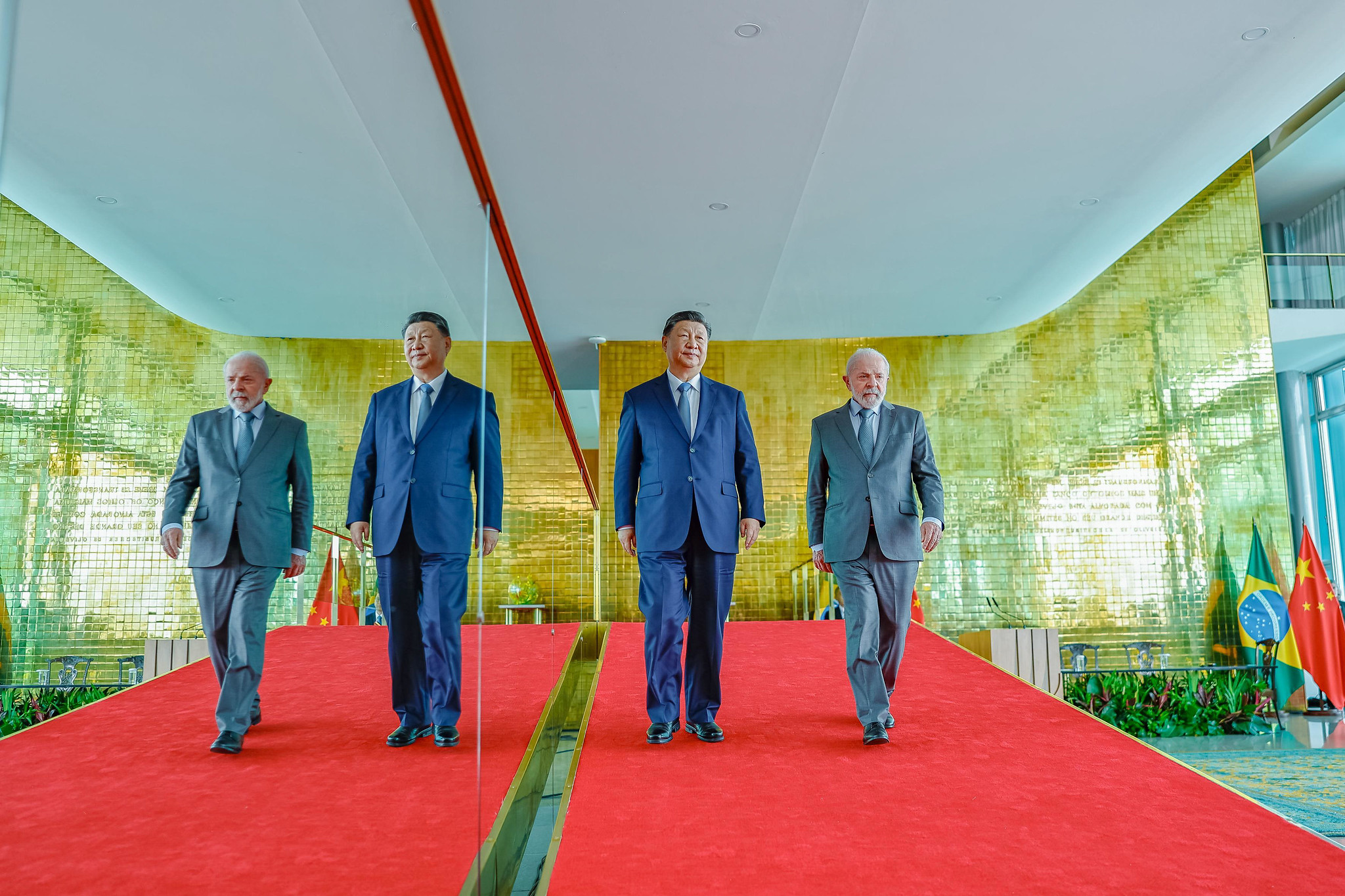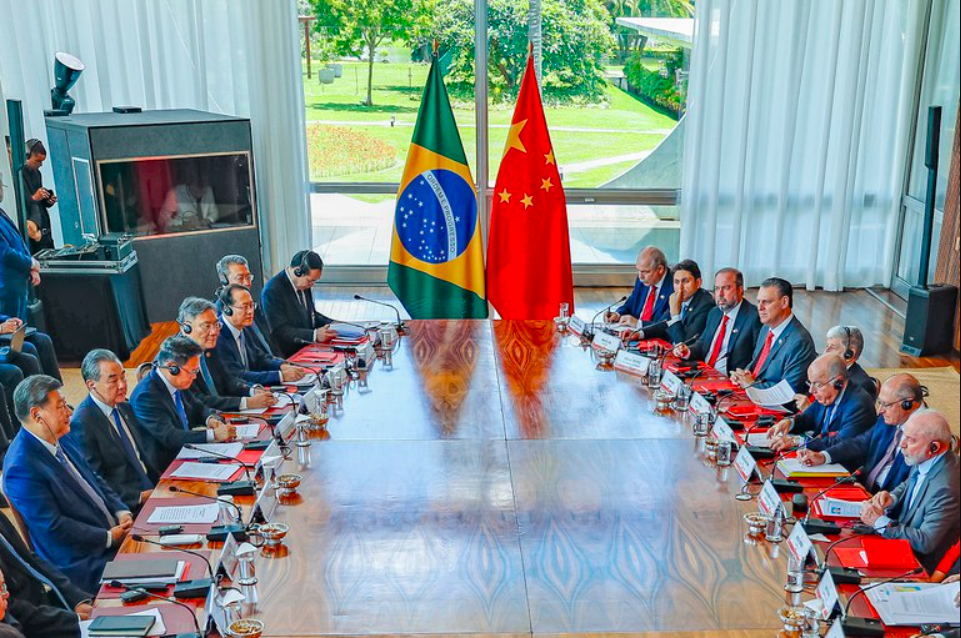
Published 20/11/2024 14:57 | Edited 11/20/2024 15:08
In the historic state visit of Chinese President Xi Jinping to Brazil, held on November 20, 2024, the two countries reaffirmed their commitment to a comprehensive strategic partnership and announced a series of initiatives to deepen cooperation in various areas. The robust agenda included 37 acts and memoranda of understanding that aim to promote joint development in agriculture, trade, investment, infrastructure, science, technology, culture and sustainability.
Lula celebrated China’s protagonism as Brazil’s largest trading partner since 2009. In 2023, bilateral trade reached a record US$157 billion, with the Brazilian surplus representing more than half of the country’s global trade balance. The relationship translates into concrete benefits, such as the generation of jobs and income in areas such as infrastructure, energy and agribusiness.
The president also highlighted the role of Chinese companies in strategic projects in Brazil, such as the construction of hydroelectric plants and railways, while Brazilian companies, such as WEG, Suzano and Randon, expand their operations in China.
Read also: Lula and Xi Jinping meet in Brasília to strengthen partnership
Xi Jinping says the G20 will have a Brazilian brand and reinforces the fight against hunger
Another highlight was the announcement of an investment of US$80 million by BRF in a meat processing factory in Henan province, reflecting the strengthening of economic exchange.
Statement by the President of China
The president of China, in turn, stated that the relationship between the two countries is experiencing its best moment in history. “I held a cordial, friendly and fruitful meeting with President Lula. We took a look back at China’s relationship with Brazil over the last 50 years. We agree that this relationship is at its best moment in history. It has an increasingly prominent strategic and long-term global projection. And it set an example for moving forward together with solidarity and cooperation among large developing countries,” said Xi Jinping in a statement to the press.
Xi Jinping also highlighted as an example the fact that Brazil and China are the two largest developing countries in two regions and occupy a leading role in the aspirations of countries in the so-called Global South – a geopolitical term that designates poor nations or those in similar socioeconomic situations, especially from Latin America, Africa and Asia.
“China and Brazil must proactively assume the great historic responsibility of safeguarding the common interests of countries in the Global South and promoting a fairer and more equitable international order,” said the Chinese president. He further advocated increasing the representation of developing countries in global governance. “It is also our consensus that China and Brazil continue to strengthen collaboration in multilateral forums such as the United Nations, G20 and Brics, confronting hunger and poverty,” he added.
For the president of China, the world is far from peaceful, “with several regions suffering from wars, conflicts, turbulence and insecurity”.
“Humanity is an indivisible security community. Only when we embrace the vision of common, comprehensive, cooperative and sustainable security will we create a universal security path. Regarding the crisis in Ukraine, I have emphasized several times that there is no simple solution to a complex issue. China and Brazil issued common understandings on a political resolution to the crisis in Ukraine and created a group of friends of peace on the crisis in Ukraine. We must bring together more voices that advocate peace and seek to facilitate a political solution to the crisis in Ukraine,” he said.
Regarding the war in the Gaza Strip, invaded by Israel, the Chinese president stated that the humanitarian situation continues to deteriorate and demanded greater commitment from the international community in an immediate ceasefire and humanitarian assistance, as well as a lasting solution that, according to he needs to ensure the existence of two States.
Technological cooperation and innovation
Lula recalled, in his statement, the 40th anniversary of the Sino-Brazilian Land Resources Satellite Project, a milestone in the technological partnership between the countries. Xi Jinping’s visit reinforced the ambition to expand cooperation in areas such as artificial intelligence, energy transition, digital economy and aerospace.
Among the commitments signed, the plan to integrate Brazilian strategies, such as the Growth Acceleration Program (PAC) and the Ecological Transformation Plan, into the Chinese Belt and Road Initiative stood out. Two task forces were announced to present priority projects within two months, focusing on productive and sustainable development.
Partnership for global peace and sustainability
At the global level, Lula and Xi reaffirmed the convergence of visions in the search for more democratic and sustainable international governance. Both advocated UN reform, promoting peace in conflict contexts, such as the war in Ukraine, and tackling hunger and climate change.
China was a central partner in the creation of the Global Alliance against Hunger, launched by Brazil at the G20, and showed interest in the Tropical Forests Forever Fund, a Brazilian initiative focused on environmental preservation.
Cultural actions and future events
As part of the agreements signed, Lula announced the Brazil-China Cultural Year for 2026, seeking to strengthen ties between societies. Xi Jinping was also invited to return to Brazil in 2025 for the BRICS Summit and COP-30, reaffirming the central role of the Sino-Brazilian partnership on the global agenda.
“I am confident that the partnership that President Xi and I have signed today will exceed all expectations and pave the way for a new stage in the bilateral relationship”, concluded Lula, highlighting the pioneering spirit and ambition of this strategic alliance.

Main highlights
Joint statement and shared future vision
The two countries signed the Joint Declaration on the Formation of the China-Brazil Community of Shared Future for a Fairer World and a More Sustainable Planet. The document reaffirms the commitment to multilateralism, the strengthening of the international order based on international law and joint actions to face global challenges, such as climate change and inequality.
Economic integration and sustainability
One of the central agreements was the Cooperation Plan which connects Brazilian initiatives, such as the Growth Acceleration Program (PAC) and the Ecological Transformation Plan, to Belt and Road Initiativefrom China. This alignment seeks to encourage investments in sustainable infrastructure, clean energy and green industrialization.
Commerce and agriculture
The visit resulted in significant advances in the agricultural sector, including:
- Export of new agricultural products: Fresh table grapes, sorghum and sesame may be exported to China, following agreed phytosanitary protocols.
- Import of seafood: Fishmeal and other Brazilian fish derivatives will be included in the list of exports to China.
Science, Technology and Industry
Several memorandums reinforced technological cooperation, with emphasis on:
- Artificial Intelligence (AI): Creation of a joint laboratory on mechanization and AI for family farming.
- Nuclear and Photovoltaic Energy: Partnerships for peaceful applications of nuclear technology and expansion of the photovoltaic industry.
- Synchrotron Light Source: Expanding the Sino-Brazilian program, Brazil and China will seek advances in applied physics and chemistry.
Education, Culture and Communication
- Tourism and educational exchange: A memorandum was signed between the Federal University of Rio de Janeiro and Tsinghua University to involve young people in global solutions.
- Cultural partnerships: Audiovisual and cinematographic cooperation through agreements between the Brazilian Ministry of Culture and Chinese institutions.
- Public media: Signing of agreements between Empresa Brasil de Comunicação (EBC) and China Media Group (CMG) to strengthen cultural and informational exchange.
Health and Sports
O Health Action Plan 2024-2026 seeks to strengthen the exchange of experiences in public policies and medical research. In the sports area, a memorandum aims to exchange practices and promote joint events.
Geopolitical impact
Xi Jinping’s visit reflects the growing influence of the BRICS on the global stage and the deepening of the Sino-Brazilian partnership, in line with the bloc’s context. With these agreements, Brazil and China reinforce their position as central actors in the search for a new geopolitical balance, based on South-South cooperation and sustainability.
The wide range of initiatives announced marks a new era in bilateral relations and reaffirms both countries’ commitment to global economic, social and environmental development.
Source: vermelho.org.br

